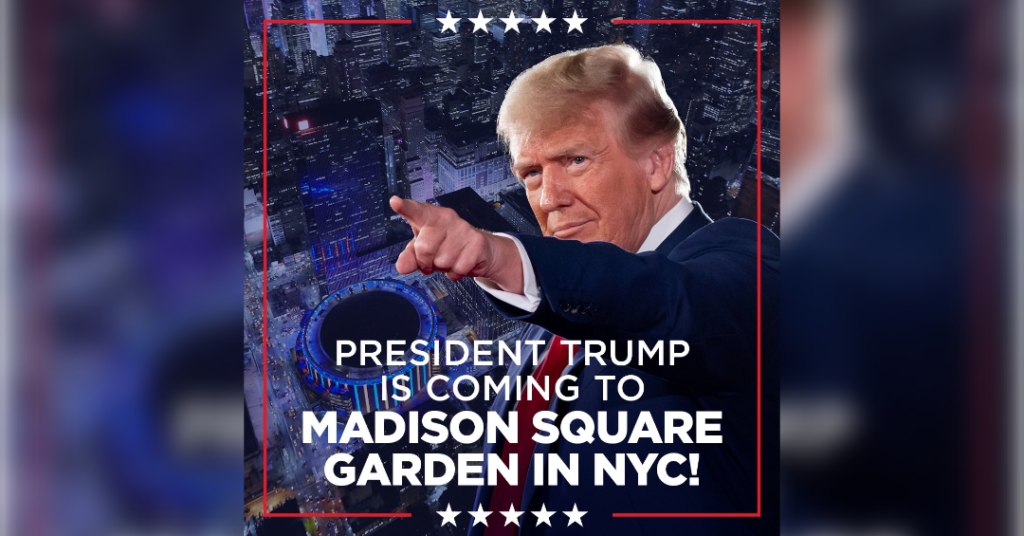On October 27, 2024, President Donald Trump is set to hold a significant rally at Madison Square Garden, aiming to galvanize thousands of supporters in New York City, which is known for hosting momentous political events. This gathering will take place at 5:00 PM EDT in the renowned arena, which can accommodate up to 19,500 attendees. The announcement follows Trump’s earlier comments during an interview with Laura Ingraham on FOX News, where he hinted at organizing rallies that would extend to the South Bronx and Madison Square Garden. The date is now officially marked in the political calendar, promising to draw a notable crowd during a pivotal time leading up to the 2024 elections.
In a press release accompanying the rally announcement, Trump’s campaign issued a pointed critique of the current administration led by Kamala Harris and local Democrats, including New York City Mayor Eric Adams. The campaign highlights the adverse economic impacts of what they describe as “dangerously liberal policies” since Harris took office. They reported that the average household in New York has incurred additional costs totaling $28,537, significantly burdening families during these challenging economic times. Among these expenses, increases in basic needs—such as an extra $4,282 on food, $4,918 on housing, and $8,912 on transportation—are cited as indicative of failed governance.
Moreover, Trump’s campaign draws attention to what they label as reckless immigration policies. Since the spring of 2022, over 210,000 migrants have reportedly arrived in New York City, significantly straining public resources and intensifying existing socio-economic issues. The financial implications of this mass migration are alarming, with estimates suggesting that it could cost the city around $10 billion. Beyond the monetary aspect, the campaign asserts that this influx has escalated crime rates, citing that illegal immigrants constitute about 75 percent of arrests in midtown Manhattan. This narrative of a chaotic urban environment is underscored by troubling incidents of crime, including those allegedly committed by migrants with documented histories of gang affiliations.
The rally at Madison Square Garden is intended to resonate with local frustrations, portraying Trump as a figure capable of restoring New York to its previous economic strength. His campaign emphasizes themes of a robust economy, job growth, secure borders, and the safety of neighborhoods as key pillars of his message. Trump’s supporters are encouraged to view him as a solution to the perceived failures of the Democratic leadership. Anticipated remarks from Trump aim to speak directly to these widespread concerns, reinforcing his platform as he seeks to sway voters disillusioned by current economic conditions.
This event follows a previous rally in the Bronx that successfully attracted tens of thousands of Trump supporters, despite concerns of potential disruption from opposing groups. Reports suggest that the turnout overshadowed the efforts of Democratic politicians and organizations attempting to stage protests against Trump. This shows that Trump’s appeal continues to resonate strongly with his base, indicating a mobilization of support that could impact the forthcoming electoral contest. The Bronx rally followed another significant gathering in Wildwood, New Jersey, which saw an estimated turnout of around 100,000, further demonstrating Trump’s ability to draw large crowds and energize his supporters.
In conclusion, President Trump’s October 27 rally at Madison Square Garden is strategically positioned within a broader campaign narrative focused on addressing economic dissatisfaction and public safety issues perceived to be exacerbated by Democratic policies. With the potential for an impressive turnout, the event serves as a crucial moment for the Trump campaign as it seeks to consolidate support ahead of the 2024 elections. As the political landscape continues to evolve, the rally represents not just a gathering of supporters but a critical campaign battleground, where issues of economic distress and crime will likely take center stage in the discourse leading up to the election.

